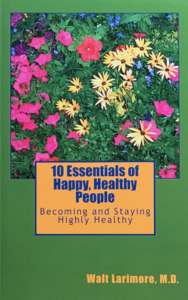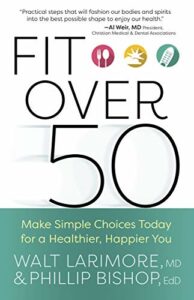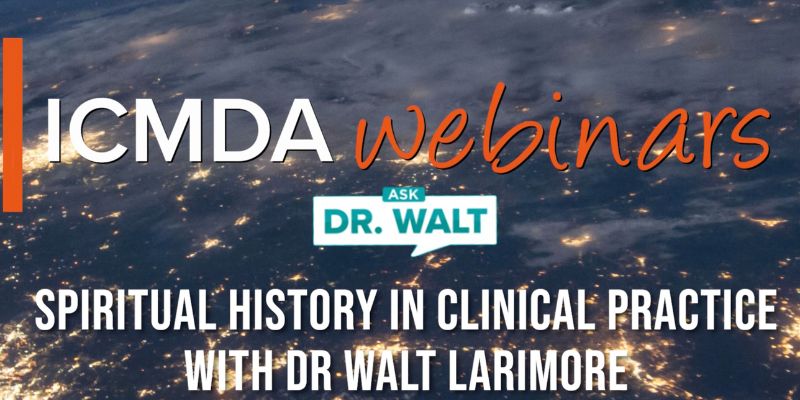Ask Dr. Walt 13 – Essential #6 – Cultivate a Positive Spirituality OR The Essential of Spiritual Health (Part 2)

How to Cherish Your Wife (Part 2)
July 28, 2023
Monthly Family Update – August 2023
August 2, 2023Ask Dr. Walt 13 – Essential #6 – Cultivate a Positive Spirituality OR The Essential of Spiritual Health (Part 2)
Did you know your spiritual health, or lack thereof, can have a direct effect on your physical and emotional health, as well as your overall and eternal wellbeing. We’ll discuss this on today’s episode of Ask Dr. Walt.
From 2021-2022, I was honored to host a TV show on LiftableTV, “Ask Dr. Walt.” In this series, I’m explaining the 10 key habits or 10 essentials of happy, healthy people.
Did you know your spiritual health, or lack thereof, can have a direct effect on your physical and emotional health, as well as your overall and eternal wellbeing. We’ll discuss this on today’s episode of Ask Dr. Walt: Essential #6 – Cultivate a Positive Spirituality OR The Essential of Spiritual Health (Part 2). You can click below to watch a video of the show, or I’ve put the show transcript at the end of the blog if you’d prefer that.
You can learn more about this topic in my best-selling book, 10 Essentials of Happy, Healthy People: Becoming and staying highly healthy or Fit over 50: Make Simple Choices for a Healthier, Happier You.
CLICK HERE FOR 10 E’S CLICK HERE FOR Fo50
Disclaimer: The Ask Dr. Walt show is designed for entertainment purposes to give information on various medical conditions, treatments, and procedures for your personal knowledge and to help you be a more informed consumer of medical and health services.
SHOW TRANSCRIPT
TEASE:
Did you know your spiritual health, or lack thereof, can have a direct effect on your physical and emotional health, as well as your overall and eternal wellbeing. We’ll discuss this on today’s episode of Ask Dr. Walt.
OPEN:
Hi, everyone. I’m family physician Dr. Walt Larimore and I’m delighted you are taking the time today to join me in my home office as we continue our discussion about some of the essentials of becoming healthy.
We’ve begun reviewing my top 10 recommendations for you to consider on a path to become healthier physically, emotionally/mentally, relationally, and spirituality.
WE’VE ALREADY COVERED:
- The essential of true health—physical, emotional, relational, and spiritual
- The essential of self-care—how to be proactive in preventing disease
- The essential of reducing SADness—stress, anxiety, and depression (2 parts)
- The essential of forgiveness—how to practice acceptance and letting go (2 parts)
- The essential of relationships—avoid loneliness like the plague (2 parts)
- The essential of spiritual health—cultivate a positive spirituality (Part One)
TODAY WE’LL COVER:
Part Two of the essential of spiritual health
IN FUTURE SHOWS WE’LL COVER
- The essential of a positive self-image—how to see yourself as your Creator sees you
- The essential of discovering your destiny—how to nurture your hopes and dreams
- The essential of personal responsibility and empowerment—how to become your own healthcare quarterback
- The essential of teamwork in healthcare—how to team up with winning healthcare professionals
In our last episode, I began sharing with you a few of the questions and comments we’ve received about this topic. Today, I’ll address some additional questions, but I also want you to take a test to evaluate your spiritual health. Be sure you have a pen or pencil and a piece of paper ready for the end of the show, okay?
We’ll start with a question from George, in Muscle Shoals, Alabama, “If spiritual health is crucial to becoming and staying highly healthy, why haven’t I heard about it before?”
It turns out that the literally thousands of studies that have looked at the association between spiritual health and physical, emotional, and relational health are spread across the many medical and social science literature of dozens and dozens of specialized areas from 1872 up to present day. If you go back and watch Part One of this program, I explain the conclusions from those researchers who have looked at most of the studies. Last time I mentioned The Oxford University Handbook of Religion and Health which has examined the religion and health relationship found in over 3,000 studies, the majority of which demonstrated a patient’s religious and spiritual beliefs were clinically beneficial and played an important role in coping with, and recovering from, illness.[1]
A summary of this massive book can be found in a review article by Dr. Harold G. Koenig of Duke University. It’s titled, “Religion, Spirituality, and Health: The Research and Clinical Implications.” You can find it online at tinyurl.com/ReligionSpiritualityAndHealth.
In this article, Dr. Koenig concludes by writing, “A large volume of research shows that people who are more [religious or spiritual] have better mental and physical health and adapt more quickly to health problems compared to those who are less [religious or spiritual]. . . . The majority of studies report strong relationships between [religiosity or spirituality] and better health.”[2]
Pauline in San Francisco writes, “What makes you think God, if He exists, wants us healthy physically and emotionally? Isn’t God all about spiritual things only?”
I’m convinced that God wants people to be as physically, emotionally, relationally, and spiritually healthy as possible. In fact, the apostle John wrote a verse that I use at the end of each of my shows: “Dear friend, I pray that you may enjoy good health and that all may go well with you, even as your soul is getting along well” (3 John 1:2).
God also wants us to enjoy healthy relationships with others. But most of all, He wants us to have a healthy relationship with Him. The Bible promises in Psalm 128:1, “Blessed are all who fear the Lord, who walk in obedience to Him.” The Hebrew word translated “blessed,” means to experience a heightened state of happiness and joy, implying favorable circumstance and enjoyment, while “fear the Lord” is to reverence Him, to worship Him, to serve Him as the Master and King of our lives. It is to walk in His ways, submissive to Him, His ways, and His Word.
I want to be very clear. According to the Bible, obedience to God does not earn or merit His blessing. To the contrary, it just positions us to receive what our Father in Heaven already wanted to give us. God wants to bless His people. The Bible tells us in Isaiah 30:18, that God ‘longs to be gracious to you’ (Isaiah 30:18).”
Now, I think it’s important to understand that the Bible does not qualify what kinds of blessings our Father wants to give each of us individually. Some may be material, others emotional, relational, physical, or spiritual. But our Creator knows us better than we know ourselves and knows what is for our best. And he promises us that everyone who reveres Him as Lord is blessed by Him. There are no exceptions or qualifications. As David wrote in Psalm 16:11, “You make known to me the path of life; you will fill me with joy in your presence, with eternal pleasures at your right hand.”
So, where do you stand in your spiritual health? I’d like to offer a brief roadmap to test your spiritual health—a simple self-test designed to help you determine how well you are doing in your personal spiritual journey. Be honest. How true is each characteristic of you?
Donna in Bonita Springs, Florida, writes, “Can spirituality ever be harmful?”
I’ve mentioned before that anything that can positively affect you can also have potential negative side effects – including religion or spirituality. Let me share with you a negative impact I see in my practice. When I take a spiritual history of my patients, if they have any sort of religious background, I ask them what I call the “LAP questions:”
- L = Loved. “Does this diagnosis or illness lead you to belief that God doesn’t love you?
- A = Abandoned. “Does this diagnosis or illness lead you to belief that God has abandoned you? Or, have you asked Him to heal you and He has not?
- P = Punished. “Does this diagnosis or illness lead you to belief that God is punishing you?
If a patient answers, “Yes,” to any of these three questions then I know that they are experiencing what the researchers call, “Religious Struggle.” And religious struggle is associated with a variety of negative health outcomes. For any of my patients with religious struggle, I always have them see their pastor or a Christian counselor to overcome this potential poison to their health.
Jackie in Pensacola, Florida, asks, “Is there a test I can use to check my spiritual health? Does it cost anything?”
There are actually several. In fact, let’s take a look at one that uses only twelve questions. If you have a pencil or pen and a piece of paper, as I go through each of the twelve statements I’m going to give you, rate yourself:
- 1 = Not at all or never
- 2 = Rarely or not often
- 3 = Somewhat or occasionally
- 4 = Usually or often
- 5 = Almost always or all the time
Now, as I go through each statement, I want you to be totally honest with the Lord and with yourself. And I’m going to be totally honest with you also. So, are you ready?
- I maintain an intense respect, awe, humility, and gratitude toward God—in acknowledgment of His superiority and perfection.
Okay, I’d give myself a 4 here as this is my attitude usually or often.
- I effectively share the substance of my faith with people who have an interest in it.
I think I’m a 4 here as I love sharing my faith with interested friends and patients.
- I pray for the needs and future of others.
I do sing the Lord’s Prayer every morning when I get up, but I’ll be honest with you. My prayer life is not as strong as I’d like. So, I’ll give myself a 4 here as I pray not nearly as much as I feel like I should.
- My decisions are based on spiritual principles and values.
I think I am really good about this, so I’ll give myself a 4.
- My speech and behavior please God.
Well, honestly, sometimes my words may not be as God-honoring as it could be, but it often is, so I’ll give myself a 4 here.
- When I pray, I both speak and listen to God.
I’ve told you I don’t pray as often as I should, and when I do, I think I speak more than I listen. I’ve been fighting this tendency by reading scripture each morning and listening as the Spirit speaks through God’s word to me. So, I’ll rate a 4 here.
- Worship is not just an event I attend—I live my life as an act of worship to God.
Actually, I’m happy to say that this is a newer discipline for me. I’m still learning how to pray without ceasing, like breathing, and how to consider my work and writing as worship. So, I’m up to a 3, but need improvement.
- I am held morally and spiritually accountable by others who know and care for me.
This has always really been important for me. My son, my wife, my mentor, and my accountability partners here locally and around the country have been great for me. This will be my first 5.
- I give away my time, abilities, and money sacrificially for the benefit of the needy.
We have always done these things, but not always sacrificially. I’ll have to confess, that for us it’s been more when it’s been convenient. So, I’ll have to rate a 3 on this one.
- I fight injustice and inequality.
I believe in justice and equality of opportunity and personhood, but I must tell you this is not something that I fight for. Certainly, this past year I’ve been much more convicted of this, but for now I’m a solid 2.
- I strive to live out the Golden Rule—to do to others what I want them to do to me.
I’ll give myself a 5 here.
- My attitudes, values, and thoughts please God.
I’m not where I need to be here. I’ll give myself a 4.
So, add up your score, and I’ll add mine. I have one 2, two 3’s, seven 4s, and two 5s, for a total of 46. So, how’d we do?
- 48-60 = Quite spiritually healthy
- 36-47 = Spiritually healthy, but need some work
- 24-35 = Leaning toward spiritually unhealthy
- 12-22 = Spiritually unhealthy
True, positive, biblical spirituality is the path to spiritual wholeness and overall health. It is a lifelong pursuit. A healthy spirituality is the foundation to the hope, health, and well-being for which we all long. How can we settle for anything less?
I have time for one final question. This one’s from Libby in Columbia, South Carolina. “Walt, what spiritual disciplines do your recommend to improve spiritual health?”
We all know that without a deliberate effort to move, and exercise, and strengthen and nourish your fleshly bodies, we’ll become deconditioned, out of shape, and overweight or obese. Not only that, we’re more likely to suffer premature disease and death.
In the same way, ignoring our spiritual health makes us spiritually flabby with weak moral muscles and weakened characters—not to mention a weakened relationship with our creator.
Of course, the opposite is also true. If we improve our physical health, strength, flexibility, and nutrition, we live a life with the potential for greater quality and quantity. We become stronger, healthier, and more capable.
And if we pursue spiritual nutrition and training, we are better able to resist temptation, and we are equipped to win spiritual warfare and resist Satan.
Spiritual strength training and spiritual nutrition refer to those regular spiritual practices that benefit our health and our lives—activities or disciplines that produce spiritual, physical, emotional, and relational health.
I like what Pastor John Ortberg says: “Practices such as reading Scripture and praying are important—not because they prove how spiritual we are—but because God can use them to lead us into life.” Although the Bible has no comprehensive “spiritual training list” that followers of Jesus should practice, it does command us to do certain things regularly.
My experience is that at least twelve spiritual disciplines all followers of Jesus should consider. If you’re not doing all of these, and most of us most definitely are not, then I’d recommend you start small—maybe with one or two of the ones that will be easiest for you—and add new spiritual health habits one at a time.
Here are my divine dozen for you to consider:
- Read, study, memorize, and meditate on God’s Word. If we want to know and enjoy God, the place to begin is God’s Word—the most powerful and reliable way He speaks to us.
- Rejoice always, pray continually, give thanks in all circumstances; for this is God’s will for you in Christ Jesus. Each of these activities involves talking to God—throughout the day, every day. Think of these first two disciplines like spiritual breathing. We breathe in God’s Word, and we speak out our CATS prayers of Confession, Adoration, Thanksgiving, and Praise to Him.
- Give generously of your treasure, time, and talent. You make a living by what you get. You make a life by what you give. Giving blesses others and delights us.
- In the future, we’ll do an entire program of fasting for you.
- Worship (celebrate) God. Worship is experiencing God and responding to Him. This can occur in celebration with others and alone with God.
- Fellowship (build community) with other followers of Jesus.
- Seek and dispense forgiveness. If you’ve not see my two episodes on forgiveness, make a point of watching them.
- Practice solitude, silence, Sabbath, and simplicity.
- Practice confession—to God and to others.
- Be discipled or mentored by someone, be accountable to at least one person, and disciple or mentor others.
- Voluntarily submit humbly to God and those in authority over you.
- Pursue purity and pursue holiness.
The Bible teaches, “The one who says he resides in God ought himself to walk just as Jesus walked” (1 John 2:6 NET). Jesus said in John 13:15, “I have set you an example that you should do as I have done for you.” And Jesus, the only perfect, sinless person ever to live, practiced all of these disciplines except confession—which in His perfection He did not need.
If Jesus thought spiritual disciplines were critical for Himself, then shouldn’t we strive to practice them ourselves?
Let me end with MY PRESCRIPTION FOR TODAY. I’ve developed a tool along with Randy Frazee, George Barna, and George Gallopa. This tool will help you delve even deeper into your spiritual health. Just go to my website, www.DrWalt.com, and scroll to the bottom of the page where I have several free health assessment tools. If you’re a Christian, a follower of Jesus, click on the tool that says, “Assess Your Health – Adult Christian.” For those who do not yet follow Jesus, look for the one that says, “Assess Your Health – Adult Secular.” With either tool, just scroll down until you find “The Spiritual Wheel.” Honestly fill out the questionnaire and it will help you grade your score and see where you stand.
These spiritual health scores are like screening tests. If you don’t rate as well as you’d like, make an appointment with your pastor or a trusted mature Christian friend and talk about what steps you can take to improve not only your spiritual health, but also have the side benefit of improving your physical, emotional, and relational health.
END OF THE SHOW
Time’s up for today. To continue your journey to becoming a highly healthy person, I hope you will fill some of this program’s prescriptions for building a positive spirituality. As you do, you’ll come to know your Creator far more deeply and sweetly—and will be able to not only know Him but make Him known to others.
If you want more information on this health essential, you may be interested two of my best-selling books: Fit over 50: Make Simple Choices for a Healthier, Happier You and 10 Essentials of Happy, Healthy People: Becoming and staying highly healthy. You can find them at DrWalt.com. Just click on the tab that says books.
And next time we’ll continue our look at the 10 Essentials of Healthy, Happy People by discussing essential of discovering your destiny—how to nurture your hopes and dreams. I’d love to hear from you. What questions do you have about the association of your spiritual health to your physical, emotional/mental, and relational health? Just send email them to me at DrWalt@Liftable.TV along with any other general health questions you might have. That’s DrWalt@Liftable.TV
So, until our next visit, “Dear friend, I pray that you may enjoy good health and that all may go well with you, even as your soul is getting along well.”
I’m Dr. Walt Larimore and I look forward to seeing you for my next episode of “Ask Dr. Walt.”
[2] tinyurl.com/y7tntsc3
Disclaimer: The “Ask Dr. Walt” show is designed for entertainment purposes to give information on various medical conditions, treatments, and procedures for your personal knowledge and to help you be a more informed consumer of medical and health services.
© Copyright WLL, INC. 2023. This blog provides healthcare tips and advice that you can trust about a wide variety of general health information only and is not intended to be a substitute for professional medical advice, diagnosis, or treatment from your regular physician. If you are concerned about your health, take what you learn from this blog and meet with your personal doctor to discuss your concerns.









